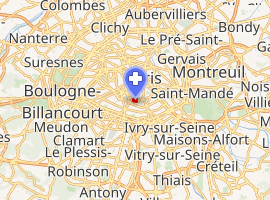Hôpital Cochin
The Hôpital Cochin is a hospital of public assistance in the rue du Faubourg-Saint-Jacques Paris 14e. It houses the central burn treatment centre of the city. The Hôpital Cochin is a section of the Faculté de Médecine Paris-Descartes. It commemorates Jean-Denis Cochin, curé of the parish of Saint-Jacques-du-Haut-Pas and founder of a hospital for the workers and poor of that quarter of Paris.[1]
| Hôpital Cochin | |
|---|---|
Cloître de Port-Royal, Hôpital Cochin, a remnant of the former Abbey of Port-Royal | |

| |
| Geography | |
| Location | rue du Faubourg-Saint-Jacques, Paris, France |
| Coordinates | 48°50′13″N 2°20′25″E |
| Links | |
| Website | www |
| Lists | Hospitals in France |
Since 1990, a biomedical research centre, the Institut Cochin, has been associated with the hospital. It was reorganised in 2002 to embrace genetic research, molecular biology and cellular biology, with a staff of about 600. It is part of both INSERM and CNRS, integrated with the Université Paris V.
In 2004 the Maison de Solenn, a shelter for adolescents, was opened within the hospital with the active support of Bernadette Chirac; its name commemorates Solenn Poivre d'Arvor.
History
Early in the morning of 30 May 1832, the mathematician Évariste Galois was shot in the abdomen during a duel at the age of 20 and died the following morning at ten o'clock in the Cochin hospital, probably of peritonitis, after refusing the offices of a priest. He was buried in a common grave in the Montparnasse Cemetery nearby.
George Orwell also had a stay at the hospital for a bout of "La Grippe" in March of 1929. He describes it in his story "How the Poor Die".
References
External links
| Wikimedia Commons has media related to Hôpital Cochin. |